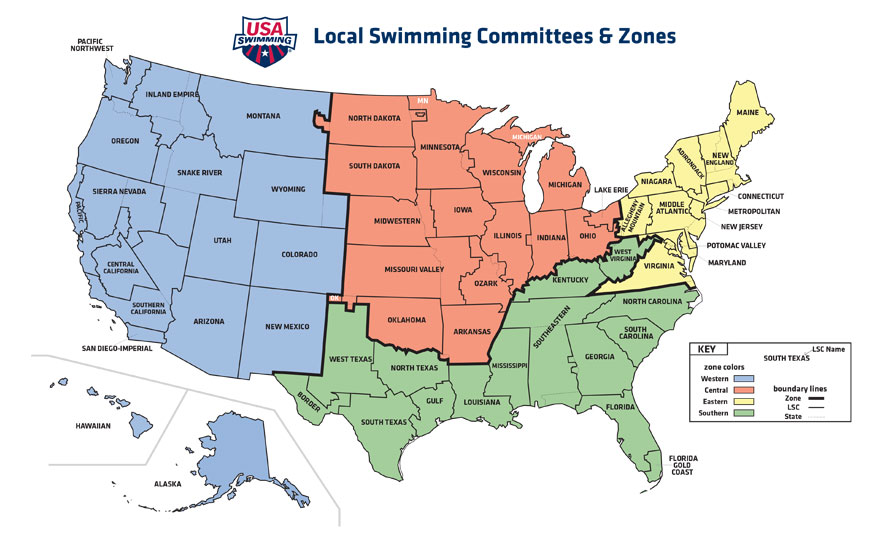
If you’re new to competitive swimming or just diving deeper into how the sport is organized, you’ve probably heard the term LSC tossed around. But what exactly is an LSC, and why is it important?
LSC stands for Local Swimming Committee
It’s a key part of the structure of USA Swimming. Think of an LSC as the regional branch of USA Swimming — kind of like how a school district works. Each LSC is responsible for a specific geographic area and plays a major role in developing and supporting swimmers, coaches, clubs, and officials within a zone.
There are 59 LSCs across the country, and they each handle a variety of important tasks. These include:
- Organizing and sanctioning local swim meets
- Registering clubs
- Certifying coaches and officials
- Offering educational and developmental programs
- Ensuring compliance with USA Swimming rules and policies
Your swimmer’s journey likely starts within an LSC. Whether it’s weekend meets at local pools or year-round competition, the LSC provides the structure and support that make those events possible.
So next time you hear someone mention your LSC (like “Pacific Swimming” or “Florida Gold Coast”), know that they’re talking about the organization working behind the scenes to keep your swim experience running smoothly.
Some LSCs Align with State Borders
In many parts of the country, LSCs match up cleanly with state lines. If you live in:
- Georgia, your LSC is Georgia Swimming
- Illinois is served by Illinois Swimming
- Iowa swimmers compete under Iowa Swimming
For swimmers in these states, it’s simple: the name of the LSC is the same as the state, making it easy to remember and recognize.
Other States Are Divided into Multiple LSCs
In larger or more densely populated states, multiple LSCs are created to manage regional needs more efficiently. For example:
- California is divided into:
- Southern California Swimming
- Pacific Swimming
- San Diego-Imperial Swimming
- Texas has:
- North Texas Swimming
- South Texas Swimming
- Gulf Swimming
These divisions help balance swimmer populations and travel distances for meets.
Some LSCs Cover More Than One State
In some areas — especially in the Northeast or Midwest — LSCs are regional and include several small states or parts of states. A few examples:
- New England Swimming includes Massachusetts, Rhode Island, New Hampshire, Vermont, and parts of Maine
- Midwestern Swimming covers Nebraska, parts of Iowa, and South Dakota
- Ozark Swimming includes eastern Missouri and parts of southern Illinois
If your team is close to a state border, don’t be surprised if your LSC crosses into another state.
How to Find Out What LSC You’re In
Here are the easiest ways to find your team’s LSC:
- Ask your coach or team administrator
- Look on your team’s website (many list their LSC in the footer or About section)
- Check the meet information sheets for local competitions
- Check the forums: Click here to access it →
Why It Matters
Knowing your LSC is important because:
- It determines what meets your swimmer can attend
- It sets rules and policies that affect your team
- It offers scholarships, camps, and athlete recognition programs
- It connects you to the broader swimming community in your region
Whether your LSC matches your state or spans across borders, it plays a huge role in shaping your swimmer’s journey.
LSCs and Zones: How It All Fits Together
Each Local Swimming Committee (LSC) is part of a larger group called a Zone. USA Swimming divides the country into four Zones: Eastern, Central, Southern, and Western. These Zones bring together multiple LSCs from neighboring states or regions and serve as a bridge between local and national levels of the sport.
Zones host regional championship meets like Zone Age Group Championships, which give top swimmers from each LSC the chance to compete at a higher level without going fully national. These meets are a big stepping stone for developing athletes, offering more intense competition and broader exposure.
In short, while the LSC is your swimmer’s home base, the Zone is the next level up — helping swimmers progress and preparing them for even bigger stages.
Check out the zone forums to get more info





